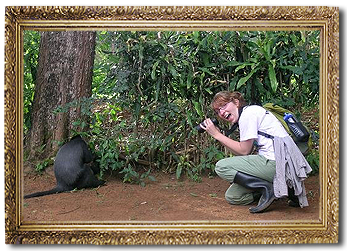 Majors: Biology and Anthropology
Majors: Biology and Anthropology
Hometown: Home, Pa.
Further Degrees: Right now, I am working on my Ph.D. in Biological Anthropology at Indiana University. I will earn an M.A. through the process once I complete my qualifying exams and defend my dissertation topic.
Current employer: Currently, I am a temporary park ranger for the Army Corps of Engineers at Lake Monroe near Bloomington, Indiana, but that is just my summer job to earn some extra money to cover grad school costs. I am still waiting on a decision for fall associate instructor positions, but hopefully I will be an associate instructor for either the Biology or Anthropology departments here at Indiana University.
As a graduate student, my real job involves the constant generation of interesting and innovative research projects in biological anthropology. I am working on a dissertation project that involves mate choice and inbreeding avoidance in wild chimpanzees at Semliki Field Station in Uganda. I may also be collecting genetic data for the project from other sites in Uganda and Tanzania. I also have several smaller projects that include inbreeding avoidance in captive gorillas and features of fossilized tibiae as evidence in the evolution of bipedalism. Finally, as a grad student, I get the honor of working for larger projects as a part of a team. Right now, I am working on a study of testosterone, immune function, and behavior in young adults at the IU Bloomington campus with several other graduate students and a faculty member.
Most important enhancing experiences while at IUP: Without a doubt my internship in Kenya has been one of the most influential experiences in my life. The HC funded me so that I could spend six months as a research assistant for the blue monkey project in Kakamega Forest, Kenya. I completed daily observations of the largest group of blue monkeys for the project, which focused on female relationships and intergroup aggression. I also assisted in collection of fecal samples for paternity testing and management of the staff of local assistants. Most importantly, I learned how to become an adult while lived a secluded, simple life in a rural forest village in East Africa.
I also spent five years as a research intern at the Pittsburgh Zoo, where I completed several of my own research projects on the gorillas. I even spent one summer doubling up as a keeper intern so that I could have more time and hands-on experience with the animals I was studying. While I was living in Kenya, I was given three keeper interns to act as my research assistants and collect data for me. It was a great learning experience in managing and teaching others the same skills I had learned just a few years earlier.
I know I already listed two, but my field school in Primate Behavior and Ecology in Costa Rica for one month was also extremely influential. My passion for field research was tested daily while I tried (and often failed) to keep up with a group of white-faced capuchins for my final project.
About my major: I knew I wanted to be a field primatologist, and so I started out as a Biology major. I found the discipline incredibly challenging, and was slightly dismayed to find that much of biology today has shifted away from ethology and macro vertebrates and toward medical science, microbiology, and biotechnology. I added Anthropology as a second major after taking one class where I discovered biological anthropologists study primates to understand human behavior and origins. The combination of lab skills, scientific methods, and human behavior that the two majors gave me has been invaluable. I participated in the National Student Exchange at the University of Calgary so that I could take primatology classes that IUP did not offer. I am also happy that my multidisciplinary background makes me a candidate for funding in multiple departments now.
The HC's impact: Core was like writing boot camp. Within my first semester at a Ph.D. program, I found myself bombarded by long, complicated readings and toughly graded essays. My lab mates, most of whom had much more education and experience than me, were shocked at how quickly and easily I could write quality essays for my classes and still get excellent grades. While most of the core classes did not focus on my specialty, they made me a well-rounded academic. Now I can converse about diverse topics with confidence. This is especially important in graduate courses, which are mainly discussion based. I kind of think of my core classes as a grad school training camp now. At the time I felt frustrated that my liberal studies courses were so much more challenging and time consuming than those of my friends outside the Honors College. Now I am grateful that I was forced to develop those skills so early on.
Also, I feel as though I will always be indebted to the HC for the funding they offered me to cover my expenses while working in (and traveling to) Kenya. I could have never afforded such an experience on my own, and would be nowhere near the professional I am now without it. The Honors College gives children from working class, blue-collar backgrounds a chance to travel abroad and experience things their parents would not otherwise be able to provide them with.
List of Majors